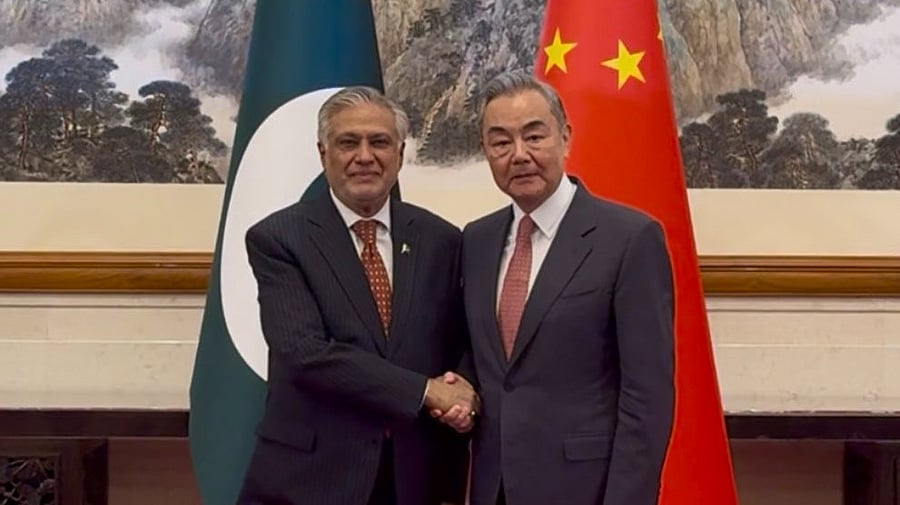
Wang's comments came during his meeting with Pakistani Deputy Prime Minister and Foreign Minister Mohammad Ishaq Dar, who is here on a three-day visit.
Credit: X/@ForeignOfficePk
New Delhi: Beijing and Islamabad have agreed to expand bilateral cooperation on security and counterterrorism, apart from adding momentum to the proposed upgraded version of the China-Pakistan Economic Corridor, although the first phase of the connectivity project itself irked New Delhi as it passed through India’s Union Territory of Jammu and Kashmir.
Wang Yi and Ishaq Dar, the foreign ministers of China and Pakistan, met in Beijing on Tuesday. This was the first meeting between the two after India and Pakistan had a four-day-long cross-border military flare-up from May 7 to 10, although they had earlier spoken to each other over the phone after the April 22 terrorist attack at Baisaran near Pahalgam in J&K had escalated tension between the two South Asian neighbours.
The two sides agreed to work together to create an "upgraded version" of the China-Pakistan Economic Corridor as well as to promote cooperation in the fields of industry, agriculture, energy and mining, human resources development, counterterrorism and security.
New Delhi opposed the CPEC 1.0 as it violated the sovereignty and the territorial integrity of India. The 3000-km-long connectivity project, a flagship component of the Belt and Road Initiative envisaged by Chinese President Xi Jinping, linked China’s Xinjiang Autonomous Region and the port city of Gwadar in southern Pakistan. It covered India’s territory in J&K under illegal occupation by Pakistan. China pledged to invest $ 65 billion in infrastructure projects along the CPEC, including the territories of India occupied by Pakistan.
The CPEC 2.0 is likely to allow China to spread its tentacles not only in Pakistan and areas illegally occupied by Pakistan but also over the region, posing a strategic challenge to India.
“As a staunch friend, China will, as always, firmly support Pakistan in safeguarding its national sovereignty and territorial integrity,” Wang was quoted telling Dar in a press release issued by the Ministry of Foreign Affairs of the government of China. He also reassured Dar of China’s support to Pakistan in resolutely combating terrorism and in playing a greater role in international and regional affairs.
Pakistan used military hardware procured from China to attack targets in India, as well as to resist and respond to the counterstrikes by India.
Dar told Wang that Pakistan would firmly safeguard its national sovereignty and territorial integrity, and, at the same time, would remain ready to hold dialogue with India to ease the tension between the two neighbours. “China welcomes and supports Pakistan and India in properly handling their differences through dialogue, achieving a comprehensive and lasting ceasefire and seeking a fundamental solution, which is in line with the fundamental and long-term interests of both sides, conducive to regional peace and stability, and also the general expectation of the international community,” Wang told Dar.
Islamabad has been blaming India for the unrest in Balochistan in Pakistan, with the Baloch Liberation Army’s offensives often targeting projects and personnel of China.
The formal dialogue between India and Pakistan has remained stalled since January 2013.
Prime Minister Narendra Modi recently made it clear that if his government would ever hold talks with the neighbouring country’s government, only two issues would be discussed – the end of anti-India cross-border terrorism from the territory of Pakistan and the end of Pakistan’s illegal occupation over the areas of the Indian Union Territory of Jammu and Kashmir.
In response to the killing of 26 people, mostly tourists, by a gang of Pakistani and Pakistan-trained terrorists in J&K on April 22, India on May 7 launched Operation Sindoor targeting the terrorist camps both in the neighbouring nation as well as in the areas illegally occupied by the neighbouring nation. Pakistan, however, responded by carrying out the strikes on civilians and military facilities in India. The offensives and counter-offensives came to a halt on May 10, after the two sides reached an understanding.
